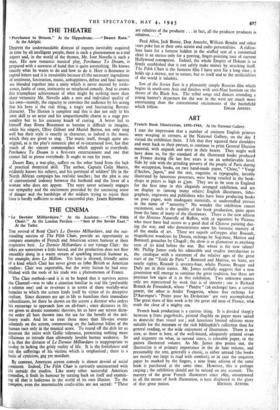THE THEATRE
"Perchance to Dream." At the Hippodrome.—" Desert Rats." At the Adelphi.
DESPITE the understandable distrust of experts inevitably acquired in time by all intelligent people, there is such a phenomenon as a real expert and, in the world of the theatre, Mr. Ivor Novello is such a man. His new romantic musical play, Perchance To Dream, is prepared with a sureness of hand that is quite astonishing. He knows exactly what he wants to do and how to do it. Here is Romance in capital letters and it is irresistible because all the necessary ingredients of sentiment, fascination, music, unhappiness, defeat and final success are blended together into a unity which is never marred by irrele- vance, faults of taste, insincerity or misplaced comedy. And to crown this triumphant achievement of what might be nothing more than sheer virtuosity Mr. Novello adds a rare and individual quality of his own—namely, the capacity to convince the audience by his acting that his hero is the real thing, a tragic and fascinating Byronic character. The illusion is complete and this is due not only to his own skill as an actor and his unquestionable charm as a stage per- sonality but to his uncanny knack of casting. A better foil to himself than Roma Beaumont as heroine is difficult to imagine, while his singers, Olive Gilbert and Muriel Barron, not only sing well but their style is exactly in character, as indeed is the music which they are given to sing. The music itself, though quite un- original, as is the play's romantic plot of re-incarnated love, has that touch of the sincere commonplace which appeals to everybody. Perchance To Dream is a first-rate entertainment and one that cannot fail to please everybody. It ought to run for years.
Desert Rats, a war-play, suffers on the other hand from the lack of practical theatrical skill. The author, Captain Colin Morris, evidently knows his subject, and his portrayal of soldiers' life in the North African campaign has realistic touches ; but the plot is one of conventional jealousy between the husband and the lover of a woman who does not appear. The story never seriously engages our sympathy and the excitement provided by the unceasing sense of danger and the hardships of the soldiers trying to rejoin their lines is hardly sufficient to make a successful play. JAMES REDFERN.


























 Previous page
Previous page